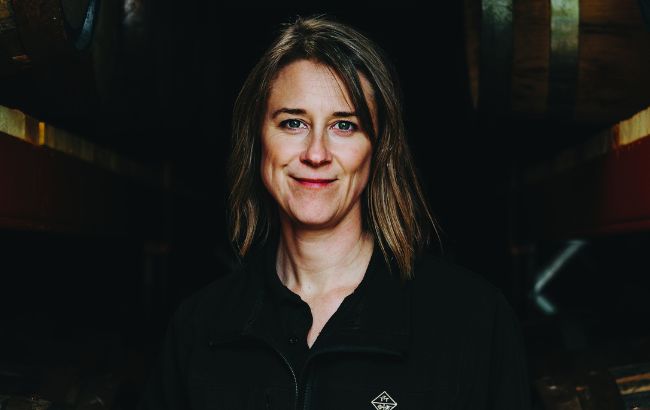A drink with… Abbie Jaume, Cooper King Distillery
Abbie Jaume, co-founder of York’s Cooper King Distillery, explains why sustainability is so integral to the company and how the team incorporates it into every part of operations.

Cooper King just distilled a whisky using net zero energy – how did that come about?
There is an urgent need to protect and restore our delicate rural landscapes, to reverse biodiversity loss, and to help the UK achieve net zero by 2050. To achieve net zero energy status, we developed innovative and sustainable distilling processes, used NASA technology paint on our still, and sourced 100% renewable energy.
Alongside this, we have reduced the carbon footprint of our operations to as close to zero as possible. Environmental consultants, Environmental Strategies, calculate our Scope 1 and 2 emissions from our distilling operations from day one – when the distillery fired up on 1 February 2018. The resulting footprint highlighted that all our hard work had paid off. The total emissions from our operations to date was a minuscule 0.6 tonnes of CO₂e, equating to an average of 0.1 tonnes of CO₂e per year. That’s less than a one-way economy flight from Leeds to Glasgow.
The final step was to remove or absorb these emissions from the atmosphere – which we did three times over – through direct air capture and tree planting.
Could you tell us more about creating a self-built distillery?
Ten years ago, I was a scientific researcher for Leeds University and Chris [Jaume, Cooper King’s other co-founder] was a chartered architect. We had studied for many years to get those positions, yet our jobs felt unfulfilling. So, we quit our jobs and bought one-way tickets to Australia, with no plans whatsoever. Soon after reaching Tasmania, we stumbled across a small distillery, Sullivans Cove, which had just been awarded World’s Best Single Malt at the World Whiskies Awards. We decided to investigate, and ended up falling in love with what we found.
Here was an island full of distilleries focused on flavour and provenance, rather than volume and reach, that were achieving international acclaim because of it. They inspired in us an absolute dedication to craftsmanship, the importance of honesty and transparency, and further reinforced our love of adventure. We spent two years there learning the craft before returning to Yorkshire to build our own distillery. Fans, friends and family helped us build the distillery on the site of an old stable block, where I grew up in North Yorkshire. The distillery houses a dedicated production area and cask maturation warehouse, together with a rustic tasting room, and a well-stocked shop.
What was the production process of your debut whisky, First Edition – Fruit + Spice?
The First Edition is the starting point for the Expedition Series of releases – a journey of discovery through the finest casks in our warehouse. It is made from English Maris Otter barley, a heritage two-row autumn-sown grain, selected for its depth of flavour and intense malty characteristics. It is floor malted for us at Britain’s oldest working maltings, Warminster Maltings.
Mashing is carried out at the distillery by hand. It’s a labour-intensive but vital process, and it keeps our distiller, Sophie Pashley, busy. Spent grains from mashing are collected by our local farmer and fed to cattle. Then follows double distillation on our custom-made 900-litre copper pot still from Tasmania, AKA Neilson – named after my father. It is the only one of its kind in the Northern Hemisphere. Its short, wide neck and innovative renewable energy heating elements help to carry over a full complement of flavour compounds in the distillate, creating a malt spirit full of fruit, body, and texture.
The new make spirit is then matured in small 100-litre oak casks in our maturation warehouse. Small casks permit a faster maturation due to the increased wood surface-to-spirit ratio, and create a rich and flavoursome whisky.
A backdrop of vanilla and oak from the Bourbon casks allows the delightfully fresh and fruity character of our new make spirit to take centre stage. We then layered up with fruit and spice from ex-Sherry and ex-red wine casks, before bringing in the Cognac cask to dial up the notes of honey, sweet malt, and soft oak.
The whisky was then bottled, labelled and batch numbered by hand, at the distillery, with no chill filtration and no caramel colouring.
What makes First Edition – Fruit + Spice stand out from others in the market, aside from its sustainability credentials?
It’s a whisky with purpose, and one that creates a positive impact. Not only is it the first in England produced with net zero energy, but it also funds rural apprenticeships for young people in the Yorkshire Dales – £5 from every bottle is donated to our charity partner, Yorkshire Dales Millennium Trust.
Work undertaken by apprentices includes restoring and protecting precious habitats such as the Yorkshire peatlands, to safeguard their natural carbon storage, which is estimated to be twice that found in forests. All of our donations go directly into the programme and we aim to raise more than £17,000 in the next 12 months.
The First Edition sold out within 10 minutes. Were you expecting such a positive response?
We were absolutely blown away by the response. The positive emails, messages, social posts and reviews that ensued were a delight to read. It’s incredibly satisfying to know that our hard work over the past 10 years has paid off, and that our customers have loved the results.
Related news
Top 10 spirits for gifting this summer
